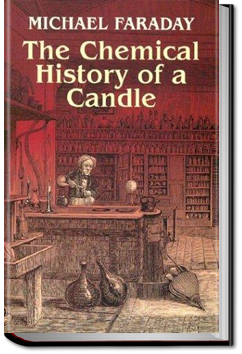

But, before I shew that, let me explain to you—as it is quite necessary for our purpose—that, though I take a candle and give you, as the general result, its combustion in the form of a flame, we must see whether combustion is always in this condition, or whether there are other conditions of flame; and we shall soon discover that there are, and that they are most important to us. I think, perhaps, the best illustration of such a point to us, as juveniles, is to shew the result of strong contrast. Here is a little gunpowder. You know that gunpowder burns with flame—we may fairly call it flame. It contains carbon and other materials, which altogether cause it to burn with a flame. And here is some pulverised iron, or iron filings. Now, I purpose burning these two things together. I have a little mortar in which I will mix them. (Before I go into these experiments, let me hope that none of you, by trying to repeat them, for fun's sake, will do any harm. These things may all be very properly used if you take care; but without that, much mischief will be done.) Well, then, here is a little gunpowder, which I put at the bottom of that little wooden vessel, and mix the iron filings up with it, my object being to make the gunpowder set fire to the filings and burn them in the air, and thereby shew the difference between substances burning with flame and not with flame. Here is the mixture; and when I set fire to it, you must watch the combustion, and you will see that it is of two kinds. You will see the gunpowder burning with a flame, and the filings thrown up. You will see them burning too, but without the prod
Get ALL YOU CAN BOOKS absolutely FREE for 30 days. Download our FREE app and enjoy unlimited downloads of our entire library with no restrictions.
Have immediate access and unlimited downloads to over 200,000 books, courses, podcasts, and more with no restrictions.
Everything you download during your trial is yours to keep and enjoy for free, even if you cancel during the trial. Cancel Anytime. No risk. No obligations.
For just $19.99 per month, you can continue to have unlimited access to our entire library. To put that into perspective, most other services charge the same amount for just one book!

As avid readers, we understand the joy of immersing ourselves in a captivating story or getting lost in the pages of a good book. That's why we founded All You Can Books back in 2010, to create a platform where people can access an extensive library of quality content and discover new favorites.
Since our founding days, we’ve continuously added to our vast library and currently have over 200,000 titles, including ebooks, audiobooks, language learning courses, podcasts, bestseller summaries, travel books, and more! Our goal at All You Can Books is to ensure we have something for everyone.
Join our community of book lovers and explore the world of literature and beyond!